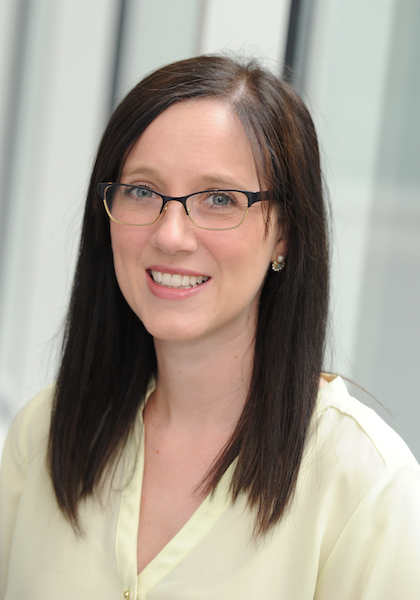Pia Biswas is a commercial lawyer at Microsoft. The company's legal department, her business unit's needs, and Pia's daily work reflect the complexity you'd expect from a huge company with diverse product offerings. While legal strategy and document drafting is an essential part of her job, she views herself as a business advisor too. Pia is a 2010 graduate of the University of the District of Columbia David A. Clarke School of Law.
Transcript
Katya Valasek:
We're joined today by Pia Biswas, a 2010 graduate of the University of the District of Columbia, David A. Clark School of Law. She is Principal Corporate Counsel for Microsoft, one of the largest companies in the world. With that size comes complexity, not only in the type of work performed, but also internal organizational structure. Pia, let's start by trying to situate where you are in the company.
Pia Biswas:
Our team is very large. I fall within our Commercial Transactions Group under our overarching corporate, external, and legal affairs team. We support North America and our LatAm region. And within that group, I sit in our partner team. And within that partner team, we support our global partner solutions group for the Americas and our sales enablement and operations team for the Americas as well.
There are times where I may be working directly with our business clients who are on the partner team. A lot of them may be partner development managers or partner marketing managers, and we may work together to resolve an issue. There are other times where I may be working with my other colleagues within the legal department if I need some assistance from them from a subject matter perspective. And an example of that could be reaching out to somebody from the litigation team or reaching out to somebody from the trademark team if I need some assistance in terms of having their guidance on a particular matter.
Katya:
It sounds like there are a lot of layers to the work that you do and the team that you work with. Can you share a little bit about whether you have any direct reports and the seniority of the team with which you work?
Pia Biswas:
In this role, I do not have any direct reports. And the way that Microsoft is structured is quite interesting compared to some other legal organizations that might be flat within certain corporations. So at Microsoft, you essentially have a lot of very senior, experienced attorneys that are coming in from various different organizations. And it's senior attorneys essentially reporting into other senior level attorneys. Obviously, there are different titles for the different layers, but it is definitely a larger structure of layers than you may find in other organizations. And I think part of that is due to the fact that the department itself is very large. Our corporate external and legal affairs group in total has about 2,000 people in it. Not everyone is an attorney and a legal professional, but a significant number of those people are.
Katya:
What would you say is the reason how a company is organized matters or impacts the work that you do?
Pia Biswas:
In my opinion, companies may vary in terms of how they structure their legal department. And it may have to do with the size of the company itself, the types of products or services that they're selling, and the complexity that may be involved in terms of the different issues that may come into play for a certain business versus another. And in our case, Microsoft as a whole has over 200,000 employees. So when you have that many employees and a wide range of products and services that we sell, it leads to our legal department being a little bit more convoluted in the way that it's structured as well.
Katya:
You are in a unique position to dig a little deeper into company organization because before Microsoft, you were at another fairly large company. You were at SAP. Can you reflect a little bit on the differences between the two legal departments?
Pia Biswas:
So, SAP, for those who may not be familiar, is another very large tech company that is headquartered in Germany and provides a lot of the technology that many people use in corporations around ERP and cloud solutions. The time that I was working there, we had about 500 or so people in the legal department. And within that legal department, it was mostly attorneys and legal professionals that supported the group, like contracts managers and paralegals, and administrative and executive assistants. That organization was a little bit flatter in terms of the different layers that we had from somebody that was coming in as a more junior attorney or legal professional to, you know, all the way to the top of our general counsel, chief legal officer for the global organization.
Katya:
What difference have you seen in the focus of your work at Microsoft compared to what you were doing at SAP?
Pia Biswas:
At SAP things were structured slightly differently because I worked in our commercial transactions group. And in that group, I supported deals pertaining to sales of our on-premise software licenses and our cloud services. We sold offerings that were part of a cloud stack and you may or may not be familiar with offerings like infrastructure as a service, platform as a service, and software as a service. So we had various offerings and I would work on the deals with our customers. And our customers tended to be very large enterprise customers that were entering into very, very large deals with SAP and very strategic matters. The focus there was a little bit more narrow in terms of it being deal work only, although I often worked on projects and had other opportunities to work on matters that were outside of that specific scope.
At Microsoft, the deal work is only one portion of the work that I do. The deals may consist of strategic partnership agreements that we would have with our partners and other types of similar partnership agreements. But I also work on other matters that are outside of just commercial transactions and it may be around helping our business clients launch new programs or campaigns or helping them with compliance matters as it pertains to our business. So it may be preventative, or it may be a question based on an issue someone's having, and they may need a resolution for that. And then lastly, it can be a miscellaneous matter that doesn't fall under any of these categories at all because part of what makes Microsoft so unique is the fact that we work on various cutting edge issues and things change every day and evolve from one day to the next.
Katya:
Can you take a second to just briefly explain what commercial law is?
Pia Biswas:
So commercial law is law that revolves around businesses doing business with one another. So examples of this might be contracts between two businesses. If one business is suing another business, that could fall under commercial law within commercial litigation. So it's a relatively broad scope, but I would say the easiest way to explain it is when two business entities are working together in some capacity.
Katya:
How are you assigned the work?
Pia Biswas:
So most frequently what ends up happening is I work with certain business clients and they come back again when they have new requests or the work may be assigned by my manager or my manager's manager. So it really can vary in terms of the avenue in which it comes through.
Katya:
You mentioned that one of your roles at Microsoft is answering random questions that you get. How do you go about answering them?
Pia Biswas:
So the random questions can really run the gamut. Sometimes it may not even be legal related, and it could just be that the business team is looking for another perspective on a matter, a more risk averse perspective, perhaps, on the matter. So I think of myself as both a legal and business advisor to the team. I'm happy to be a partner to our partner team and help them brainstorm through different business scenarios as needed.
Katya:
Can you think of an example of a random question that you were presented with as an area of research?
Pia Biswas:
So sometimes I may receive a request that may require me to understand the way that Microsoft operates from an operational standpoint. And that's not something I always have visibility into. And when I receive those requests, that's when I do have to do a little bit more research in terms of figuring out how we are doing things from an operational standpoint and understanding how the process works, so that I can provide the best guidance to our partner team. An example of a compliance matter that I may receive would be possibly to ensure that a new program that the business team is trying to launch is done so in a compliant manner. And that may require us, together, the partner team and me together, to reach out to other groups like our internal compliance team and possibly our finance team, if there's any sort of money exchange that's being involved, and other subject matter experts, potentially in a product group, if it involves a certain product or service, to all come together and make sure that we are aligned as to what that new program or offering may entail before it is launched to the audience.
Katya:
So when you talk about the compliance work that you do, you are referring to internal policies at Microsoft and not laws and regulations?
Pia Biswas:
Correct. You know, we have various areas of compliance within the organization and some are revolving around making sure that we are operating our business in accordance with the laws and regulations that are applicable to us. But the matters that I work on in terms of a compliance perspective are the requests that come through to ensure that we are following our own, Microsoft, set of policies for how we do business.
Katya:
You've mentioned that you also do some deals in terms of strategic partnership agreements. What are strategic partnership agreements?
Pia Biswas:
Our strategic partnerships revolve around deals that we have with our partner organizations. And these partner organizations may sometimes and often be a customer of ours too. And they're a customer through various means, but one that I will touch on is Azure consumption. So, Microsoft has an offering to sell cloud infrastructure, which is Microsoft Azure. And we often have our customers who purchase consumption on our Azure infrastructure in order to build their solutions to sell to their end customers. So oftentimes we will have partners that we designate as partner customers that we also designate as independent software vendors who develop their solutions on Azure. And they require some assistance how to go to market with this offering or how to co-sell this offering. And that is where we jump in our partnership agreement to figure out a way where both parties can help to make the partner solution flourish on our Azure platform.
Katya:
As you are working on partnership agreements, do you work from form agreements?
Pia Biswas:
We do have a standard form that we typically can work from for our partner agreements called our strategic partnership agreement, but there are times where we may need to customize it in certain areas to make sure that it fits the scope of the transaction and partnership that's taking place in that particular matter.
Katya:
As you make these changes, what does the review process look like?
Pia Biswas:
So we will work together with the business team to ensure that the initial document that they receive for the strategic partnership agreement is properly aligned with what is happening in that transaction from a commercial standpoint. And after it's sent to the partner, they may sign it or they may have some questions or red lines and then we review it and take it from there.
Katya:
You are already doing so much, as we can tell from what you've shared with us. You also play a part in the work that's done for new programs and campaigns. How do you get involved in this aspect of your work?
Pia Biswas:
The business team will engage us when they are working on a new program or campaign if they have any questions around any potential legal ramifications or compliance concerns. And that's where we from legal may come in and a compliance expert may come in just to ensure that the program that the business team is thinking of launching is as compliant as can possibly be.
Katya:
So the new programs and campaigns then is an area where the larger partner team in which you work overlaps in various ways. Does the work that you do on the new programs and campaigns often spin off into one of the other two buckets, let's say compliance or the strategic partnership agreements.
Pia Biswas:
So it's interesting because it can. I mean, hopefully not the compliance bucket, because then that would mean something was not done compliantly. So thankfully nothing has come back on those new programs yet. But theoretically, it could if somebody identified a potential compliance issue that may arise from a program that we just launched. It could also result in additional deals, but that would depend. It may or may not be something that I would be working on.
Katya:
So we've talked through four buckets of work that you do in your day to day. Is the division really that clean?
Pia Biswas:
It is not, unfortunately. That is more of an idealistic oversimplification for the purposes of explaining the work, but there are times where an issue may touch on one or more of the buckets. So, an example of the overlap may be that creating a new program may also require looking into the compliance aspect of it. So now you have two buckets that are involved simultaneously for one matter, or there may be other miscellaneous questions that may fall under the random bucket that can come up with any of these matters -- that may come up with a deal or a program or a compliance matter. While there are times there can just be a very simple question that would squarely fall under one category, there are often also times where it may fall under more than one category at once
Katya:
Do you track your time in the work that you do in any way tied to these buckets? Or do you just do work as it comes your way?
Pia Biswas:
I don't strictly keep track of the time that I spend on each of the categories because I'm just thankful to not be billing hours. and not being in a law firm setting, but I do notice that there are trends depending on where we are in our fiscal year in terms of the types of requests that we might get. So for new program or campaign creation, those requests may come at the beginning of the fiscal year, although it doesn't mean that it can't happen at any other point during that year. Deals can consistently come through depending on whenever we are in talks with our partners and when we both feel ready to move forward. But there may be times during the end of the fiscal year where our partner decides that they want to make sure that they are onboarded with us.
Katya:
Totally understand your sentiment about the relief of no longer having to bill hours. I think it would be great to spend a second to just talk about the difference between doing work in a firm setting and doing work as in-house counsel.
Pia Biswas:
That's such a great question because there is a really big difference in terms of the type of support that you would provide. In a law firm setting, as many folks know, billing time is very critical because that is how the law firm stays afloat. And a lot of times, providing value to customers may be in the form of providing long memos, identifying every risk that may potentially come your way as you work through a matter, and being a little bit more cautious in terms of how you guide your client in that matter. In the in-house setting, the role shifts a bit because you are now more of a practical business/legal advisor. And your goal in this setting is to ensure that the business is successful and that the business team is able to meet their objectives. So a lot of the guidance that's being provided is a lot more practical in this setting. And you may assess different risks and let the business team know about the risks of doing something. But ultimately, you are looking to find quicker, more practical, but compliant solutions to help enable the business. It's not a philosophical exercise of providing lengthy memos with every possible issue, but rather balancing the need for the business to proceed and the risks that they may encounter along the way to help them determine the right balance and the right risk tolerance that they feel comfortable.

 Katya Valasek
Katya Valasek






